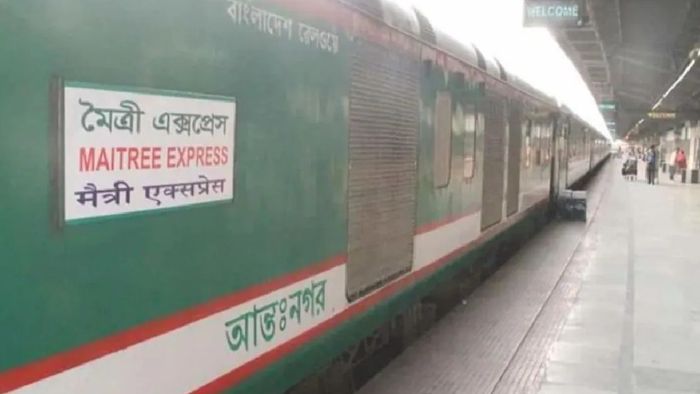India-Bangladesh relations strain amid ongoing protests, Maitree Express stranded in Dhaka
The relationship between India and Bangladesh has faced fresh challenges due to ongoing unrest in Bangladesh. As a result, the Maitree Express, a train symbolizing bilateral cooperation, remains stranded in Dhaka.

- Oct 14, 2024,
- Updated Oct 14, 2024, 11:33 AM IST
The relationship between India and Bangladesh has faced fresh challenges due to ongoing unrest in Bangladesh. As a result, the Maitree Express, a train symbolizing bilateral cooperation, remains stranded in Dhaka. The situation has been compounded by rising anti-India sentiments in Bangladesh, fueled by fundamentalist groups and a lack of experienced governance.
The Maitree Express, which serves as a vital link between Kolkata, India, and Dhaka, Bangladesh, has been caught in the crossfire of political and social unrest in Bangladesh. Official sources confirmed that the train, which resumed operations in 2008 after a 43-year hiatus, was in Bangladesh when large-scale protests erupted in the neighboring country. These protests, led by students and other factions, have created a volatile situation in Dhaka, forcing India to take precautionary measures.
The protests in Bangladesh began due to various internal grievances, with students at the forefront demanding political reforms and economic stability. The unrest coincided with the train's arrival in Dhaka, resulting in Indian authorities having to make swift decisions. Despite the chaotic environment, the Maitree Express, escorted by security personnel, managed to reach its final destination in Dhaka safely. However, with the situation deteriorating, the Indian Embassy made the call to evacuate the train's staff, including the locomotive pilots, back to India via air. The train, however, remains stranded in Dhaka, and its operations have been suspended indefinitely.
Also read: Assam: Missing child found dead in Margherita river during Durga Puja festivities
India has adopted a cautious approach, waiting for the situation to stabilize before taking any further steps regarding the resumption of the Maitree Express. The Indian government is maintaining a "wait-and-watch" policy, closely monitoring developments in Bangladesh. Official sources have highlighted that the unrest, particularly the anti-India rhetoric fueled by fundamentalist forces, is complicating the situation. These groups are attempting to incite anti-India sentiment among the Bangladeshi populace, leveraging the unrest to push their own agendas.
However, despite the tension, India has continued its humanitarian assistance to Bangladesh, particularly in the form of food supplies. Indian officials are acutely aware that any disruption in the supply of essential goods could exacerbate the crisis, leading to further instability in Bangladesh. According to sources, halting the supply of food items could lead to increased cross-border infiltration into India by Bangladeshi nationals seeking basic necessities. Additionally, the decision to continue sending aid reflects India's broader strategy of maintaining goodwill with the Bangladeshi public, despite the current unrest.
The political situation in Bangladesh is further complicated by the fact that the interim government lacks the experience to handle international relations effectively. While Md Yunus, a respected economist and Nobel laureate, heads the interim government, his expertise lies in microeconomics, and he has little background in international diplomacy or crisis management. This lack of experience has made it difficult for Bangladesh to navigate its relationships with neighboring countries during this period of unrest.
According to Indian sources, this gap in diplomatic expertise is not only affecting bilateral relations with India but also with other countries. The absence of seasoned diplomats or leaders with international experience is likely to pose challenges for Bangladesh as it tries to stabilize both its domestic and foreign affairs. Indian officials believe that, in the long term, Bangladesh will need to rebuild its diplomatic capacity to handle international relations more effectively.
Despite the current challenges, India remains optimistic that the situation will eventually normalize. Indian officials are confident that Bangladesh, as a smaller neighboring country, will have to come closer to India in the future, both for economic and political reasons. While anti-India rhetoric remains strong in some parts of Bangladesh, especially among fundamentalist groups, Indian sources believe this sentiment will die down over time as the country stabilizes.
India's long-standing relationship with Bangladesh is built on historical, cultural, and economic ties, and both countries have much to gain from a stable partnership. The Maitree Express, which was relaunched to symbolize friendship and cooperation between the two nations, remains a key part of this relationship. Although its current suspension is a setback, Indian officials are hopeful that once the political climate in Bangladesh improves, the train service will resume and the two countries can continue building on their shared interests.